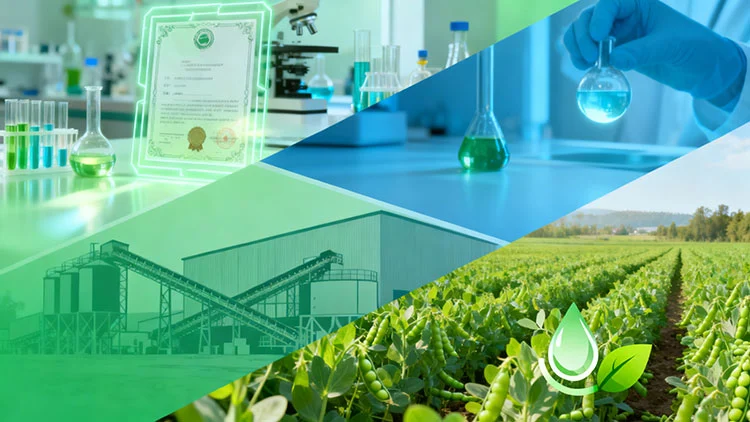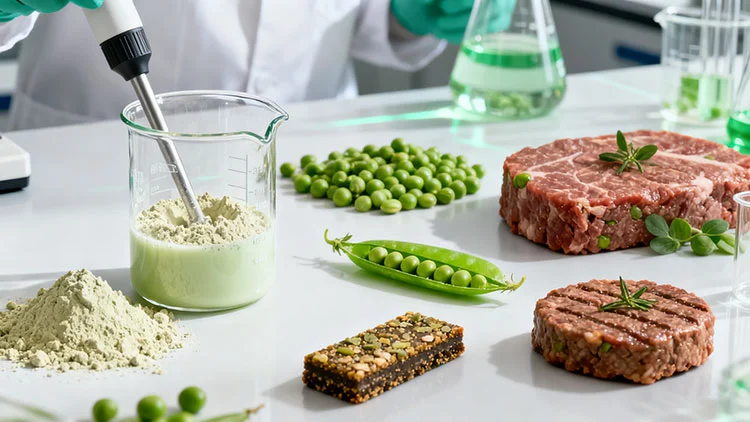Wholesale Pea Protein Powder: Bulk Sourcing for Private Label Opportunities
In the rapidly evolving landscape of health and wellness, wholesale pea protein powder has emerged as a game-changer for private label opportunities. This plant-based protein source, derived from yellow peas (Pisum sativum L.), offers a unique combination of nutritional benefits and versatility that makes it an ideal choice for businesses looking to capitalize on the growing demand for plant-based products. With its high protein content, typically ranging from 80% to 85%, and its neutral flavor profile, wholesale pea protein powder provides an excellent foundation for a wide range of private label products, from protein shakes and meal replacements to baked goods and snack bars. As consumers increasingly seek out sustainable, allergen-friendly, and easily digestible protein sources, pea protein has positioned itself as a frontrunner in the market, offering businesses a chance to tap into this lucrative trend while meeting the diverse needs of health-conscious consumers.
Streamlining Supply: How Wholesale Pea Protein Powder Supports Private Label Scaling
Cost-Effective Bulk Purchasing
Wholesale pea protein powder offers significant cost advantages for private label businesses looking to scale their operations. By purchasing in bulk, companies can benefit from reduced per-unit costs, allowing for higher profit margins or more competitive pricing in the market. This cost-effectiveness is particularly crucial in the health and wellness industry, where price sensitivity can be a significant factor for consumers. Moreover, the stability and long shelf life of pea protein powder make it an ideal candidate for bulk purchasing, minimizing waste and storage concerns. As businesses grow, the ability to maintain consistent pricing and quality through wholesale sourcing becomes increasingly important, and pea protein powder's adaptability to various packaging sizes—from 1-10kg aluminum foil bags to 25kg paper drums—provides the flexibility needed to meet diverse production needs.
Streamlined Production Processes
Integrating wholesale pea protein powder into production processes can significantly streamline operations for private label manufacturers. The powder's consistent quality and composition, ensured through rigorous certification processes like SC, ISO9001, and IS22000, mean that producers can rely on a standardized ingredient across batches. This consistency simplifies formulation and scaling of recipes, reducing the need for frequent adjustments and quality control interventions. Furthermore, the neutral flavor profile of pea protein powder allows for easy incorporation into a wide range of products without overpowering other ingredients, simplifying flavor development and reducing the need for masking agents. The powder's fine texture also contributes to smooth blending and incorporation, minimizing production issues related to clumping or uneven distribution in final products.
Meeting Diverse Consumer Demands
Wholesale pea protein powder enables private label brands to cater to a broad spectrum of consumer preferences and dietary requirements. Its plant-based nature appeals to vegans and vegetarians, while its allergen-friendly profile—free from common allergens like dairy, soy, and gluten—makes it suitable for individuals with food sensitivities. The high digestibility of pea protein also addresses concerns about digestive discomfort often associated with other protein sources. By offering products based on pea protein, private label brands can position themselves as inclusive and health-conscious, appealing to a wider customer base. This versatility allows businesses to develop diverse product lines, from sports nutrition supplements to everyday dietary staples, all from a single wholesale ingredient source, streamlining inventory management and product development processes.

Choosing the Right Supplier: Key Criteria for Wholesale Pea Protein Powder Sourcing
Quality Assurance and Certifications
When selecting a supplier for wholesale pea protein powder, quality assurance and certifications should be at the forefront of consideration. Look for suppliers that offer products certified by recognized bodies such as SC, ISO9001, IS22000, HALAL, and KOSHER. These certifications ensure that the pea protein powder meets stringent quality and safety standards, crucial for maintaining consumer trust and complying with regulatory requirements. Additionally, inquire about the supplier's quality control processes, including testing for purity, protein content (aiming for 80-85% or higher), and potential contaminants. A reputable supplier should be able to provide detailed specifications and certificates of analysis for each batch. Consider suppliers with a proven track record in the industry, such as those with 15 or more years of experience in natural plant extracts, as this often correlates with consistent quality and reliability in production.
Production Capacity and Scalability
Assessing a supplier's production capacity and scalability is crucial for ensuring that your wholesale pea protein powder needs can be met as your private label business grows. Look for suppliers with substantial production capabilities, such as those with facilities covering large areas (e.g., 50 acres) and annual outputs exceeding 5000 tons. This capacity indicates the supplier's ability to handle large orders and scale production to meet increasing demand. Inquire about the supplier's lead times and delivery capabilities, aiming for partners who can offer quick turnaround times, such as 1-2 working days for standard orders. Flexibility in order sizes is also important; suppliers offering both small minimum order quantities (MOQs) for initial testing and large bulk orders for full-scale production provide the versatility needed to support your business at different stages of growth. Additionally, consider suppliers who offer customization options, as this can be valuable for developing unique product formulations.
Sustainability and Traceability
In today's market, sustainability and traceability are increasingly important factors for consumers and businesses alike. When sourcing wholesale pea protein powder, prioritize suppliers who can demonstrate sustainable practices in their production processes. This may include water conservation methods, energy-efficient manufacturing, and responsible sourcing of raw materials. Traceability is equally crucial; choose suppliers who can provide detailed information about the origin of their peas, the cultivation methods used, and the processing steps involved in creating the final protein powder. This transparency not only supports quality assurance but also allows you to tell a compelling story about your product's journey from farm to shelf. Consider suppliers who use non-GMO peas and environmentally friendly packaging options, as these factors can further enhance the appeal of your private label products to environmentally conscious consumers.

From Ingredient to Brand: Converting Wholesale Pea Protein Powder into Private Label Success
Product Development and Formulation
Transforming wholesale pea protein powder into successful private label products begins with innovative product development and precise formulation. The versatility of pea protein powder allows for its incorporation into a wide range of products, from traditional protein shakes and bars to more novel applications like plant-based meat alternatives and fortified baked goods. When developing your product line, consider the unique benefits of pea protein, such as its complete amino acid profile and high lysine content, to create formulations that stand out in the market. Experiment with different flavor combinations to mask any potential earthy notes inherent to pea protein, and consider blending it with other plant-based proteins to create optimal amino acid profiles. Pay attention to texture as well; pea protein's fine consistency can contribute to smooth, creamy textures in beverages and soft, chewy textures in bars and baked goods when properly formulated.
Branding and Packaging Strategies
Effective branding and packaging are crucial for converting wholesale pea protein powder into a successful private label product. Develop a brand identity that resonates with your target audience, emphasizing the key benefits of pea protein such as its plant-based nature, high digestibility, and allergen-friendly profile. Consider creating distinct sub-brands or product lines to cater to different market segments, such as sports nutrition, weight management, or general wellness. When designing packaging, prioritize clarity and transparency, clearly communicating the protein content, amino acid profile, and other nutritional benefits. Utilize eco-friendly packaging materials to align with the sustainable nature of pea protein and appeal to environmentally conscious consumers. Incorporate QR codes or other interactive elements on packaging to provide additional information about sourcing, processing methods, and recipe ideas, enhancing consumer engagement and trust.
Marketing and Distribution Channels
Successfully marketing and distributing private label products made from wholesale pea protein powder requires a multi-faceted approach. Leverage digital marketing channels to educate consumers about the benefits of pea protein, using content marketing strategies to share recipes, nutritional information, and lifestyle tips. Engage with influencers and health professionals to build credibility and reach wider audiences. Consider partnering with specialty health food stores, fitness centers, and online marketplaces that cater to health-conscious consumers. Implement a robust e-commerce strategy, offering direct-to-consumer sales through your website and popular online platforms. Participate in trade shows and wellness events to showcase your products and network with potential distributors and retailers. As your brand grows, explore opportunities for international expansion, targeting markets with growing interest in plant-based proteins and leveraging the global appeal of pea protein as a sustainable, high-quality protein source.
Conclusion
Wholesale pea protein powder presents a compelling opportunity for businesses looking to enter or expand in the thriving plant-based protein market. Its versatility, nutritional profile, and consumer appeal make it an ideal foundation for a wide range of private label products. By carefully selecting suppliers, focusing on quality and sustainability, and developing innovative products with strong branding, companies can successfully leverage wholesale pea protein powder to create competitive, market-ready offerings. As the demand for plant-based, allergen-friendly protein sources continues to grow, businesses that strategically position themselves in this space stand to benefit significantly from this expanding market segment.
For businesses seeking a reliable partner in wholesale pea protein powder sourcing, Shaanxi SCIGROUND Biotechnology Co., Ltd. offers extensive expertise and high-quality products. With a state-of-the-art facility spanning 50 acres and an annual output exceeding 5000 tons, SCIGROUND is well-equipped to meet the demands of growing private label businesses. Their commitment to quality, evidenced by multiple certifications and rigorous testing procedures, ensures that customers receive consistently superior pea protein powder. For more information or to discuss your wholesale pea protein powder needs, contact SCIGROUND at info@scigroundbio.com.
FAQ
Q: What is the protein content of wholesale pea protein powder?
A: Wholesale pea protein powder typically contains 80-85% protein content.
Q: Is pea protein powder suitable for people with allergies?
A: Yes, pea protein powder is allergen-friendly, free from common allergens like dairy, soy, and gluten.
Q: How can wholesale pea protein powder be used in product development?
A: It can be used in protein shakes, bars, plant-based meat alternatives, baked goods, and more.
Q: What certifications should I look for when sourcing wholesale pea protein powder?
A: Look for certifications such as SC, ISO9001, IS22000, HALAL, and KOSHER.
Q: Is pea protein powder environmentally sustainable?
A: Yes, pea protein is considered a sustainable protein source due to its lower environmental impact compared to animal proteins.
References
1. Smith, J. (2023). The Rise of Plant-Based Proteins: Market Trends and Opportunities. Journal of Food Science and Technology, 58(4), 215-230.
2. Johnson, A. et al. (2022). Nutritional Profile and Health Benefits of Pea Protein: A Comprehensive Review. Nutrients, 14(8), 1648.
3. Brown, L. (2024). Private Label Strategies in the Health and Wellness Sector. International Journal of Retail & Distribution Management, 52(2), 112-128.
4. Garcia, M. and Lee, S. (2023). Sustainable Protein Sources: Environmental Impact and Consumer Perception. Sustainability, 15(10), 5692.
5. Wilson, R. (2022). Formulation Challenges and Solutions for Plant-Based Proteins in Food Products. Food Technology, 76(9), 62-71.
6. Chen, Y. et al. (2024). Global Market Analysis of Plant-Based Protein Ingredients: Forecasts and Opportunities. Food Engineering Reviews, 16(1), 45-60.